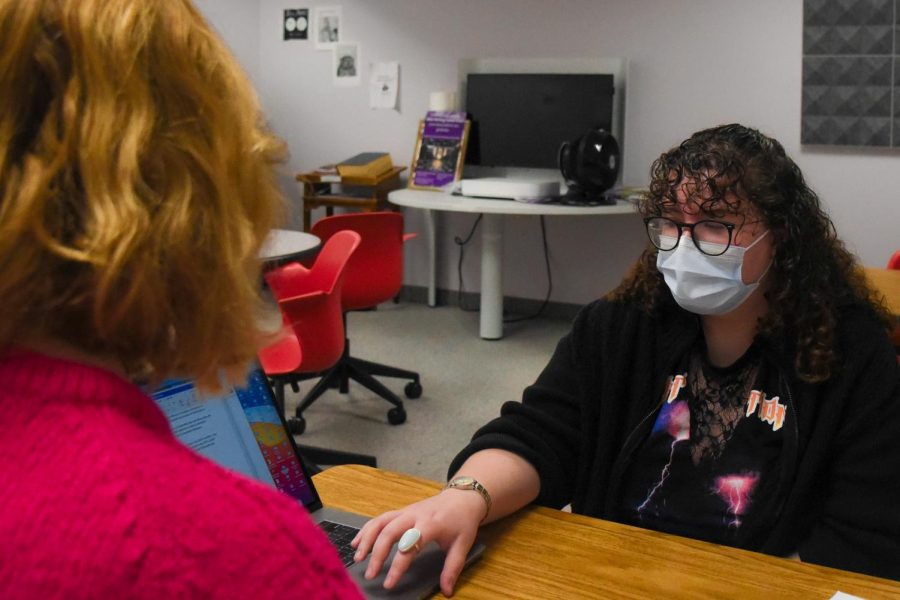Impacts of English’s graduate program ending by Spring 2024
Jena Archer, a graduate student at the Winona State University Writing Center. With the English graduate program’s funding being cut, the Writing Center’s available hours could drop as low as 30 to 40 hours which would challenge the center to keep open.
March 15, 2023
Beginning the Fall 2022 semester, the English graduate program’s funding for assistantship positions was cut, another cut following a trend from previous years, according to English department chair Ann-Marie Dunbar.
In November 2022, the English department decided to officially discontinue their graduate program. The English graduate program is currently in a teach out phase and is not accepting any new people into the program. Dunbar commented that the program is projected to be completely over by Spring 2024.
What kind of implications will the loss of the English department’s graduate program have? According to Elizabeth Zold, the English department’s graduate studies director, this loss will have profound impacts across the university.
Losing the English department’s graduate program has two major impacts that ripple out to other things. This change will affect the Writing Center and the workload of faculty in the department.
The Writing Center has been around since the 1990s, and is currently situated on the third floor of Minné Hall. The Writing Center offers free one-on-one help to undergraduate and graduate students on a variety of writing topics from all different disciplines. The Writing Center is primarily staffed by graduate students working assistantship hours in the center. According to Liberty Kohn, the Writing Center director, graduate students make up 70 to 80 percent of the hours available in the Writing Center.
“[Graduate students] are most of my labor, right? You know, we think of the university as this place with students, but also students provide a lot of services and it’s a job in many ways,” Kohn said.
The number of people working at the Writing Center plays a major role in the center’s hours. Previously, with graduate students, the goal was 120 hours with multiple tutors working later into the day. Now, Kohn sometimes struggles to manage 60 hours, and he commented that in the future the Writing Center’s available hours could drop as low as 30 to 40 hours which would challenge the center to keep open.
The loss of the English department’s graduate program means a huge loss in the Writing Center’s workforce; this means worse outcomes for people seeking tutoring as well as a loss for graduate-level tutoring. Kohn’s goals for the Writing Center is to maintain hours and quality. One way he plans to maintain quality is through “master tutors.”
“We’re looking to maybe hire master tutors…,” Kohn said. “A master tutor would be someone with at least one degree, if not more, in English and with tutoring experience, and to potentially hire them as well to serve the same function as our graduate students, sort of advanced in the field, so we need to replace them somehow. All that expertise needs to be replaced.”
To maintain hours for the Writing Center, the English Department is looking for ways to incentivise students to work in the center. One way is to pay students. Of course, this opens a whole other can of worms about funding the Writing Center which was previously free. The English Department is currently looking into different options.
“It was a brilliant model while we had a graduate program because…essentially nobody had to come up with a budget for it. But that’s not the case anymore. So we’re looking for sources for funding,” Dunbar said.
The second major impact of the English graduate program’s ending is on the workload of faculty in the department. The other major thing English graduate students did was teach sections of English 111, College Reading and Writing, a course that all incoming first-years take at Winona State University.
It is important to note that the extra strain put on faculty in the English department to pick up the slack and teach extra sections of English 111 is compounded by the loss of faculty in the department in the last few years. By the end of the Spring 2023 semester, the English Department will have lost eight faculty members in three years, a 40 percent decrease in faculty, according to Dunbar.
“It’s certainly a fair point that the student body is smaller at this point at Winona State, so it would make sense to have a slightly smaller faculty, right?” Dunbar said. “But the student population here has not decreased by 40 percent in the last three years. It’s really disproportionate in this department.”
A major reason for this sudden decline in English department faculty stems from the funding issues in higher education. At universities, people are a large part of the expenses. So, in the last few years, a number of faculty have received early retirement deals or a BESI (Board Early Separation Incentive) to help cut back on costs. This is a cost-saving measure not unique to the English department or Winona State University.
The loss of the English department’s graduate program raises questions about enrollment and how faculty will be able to teach enough sections of English 111 for incoming first-years. It also raises questions about hiring new tenure-track faculty, which Dunbar has been told there is not funding for.
It is important to note that the funding issues and all the problems that stem from it are not unique to the English department or Winona State. Read Sophie Sailer’s all encompassing article on this topic in the March 15 paper or on our website.
Despite the English Department’s graduate program ending, Winona State has over 30 graduate programs and has consistently been adding more in recent years. Simultaneously, there have been funding cuts to graduate programs. In this fashion, Winona State’s graduate programs can be seen as a mile wide but only an inch thick. Zold gave her perspective on graduate programs and the Domino effect of budget cuts and shutting down programs.
“I think that if we want to show as a university that we support graduate programs, I think then they have to literally put their money where their mouth is and fund them,” Zold said. “And I know that, you know, everyone knows, funding for higher education is abysmal. Budgets just keep getting cut everywhere. But I do, I do think that we really need to think about where our priorities are and the repercussions of programs like this shutting down.”
The English graduate program will entirely be over by Spring 2024. Dunbar hopes that some of the funding issues in high education will be solved soon but it does not seem likely. Keep up with The Winonan for more stories about budget deficits, their impacts as well as other campus news.




































